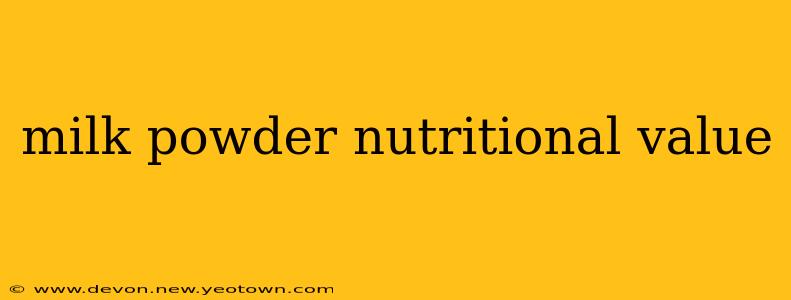Milk powder, a concentrated form of milk, has been a pantry staple for decades. From adding creaminess to coffee to serving as a crucial ingredient in baking and even providing a quick and nutritious meal replacement, its versatility is undeniable. But beyond its convenience, lies a treasure trove of essential nutrients. This in-depth exploration delves into the nutritional value of milk powder, answering common questions and dispelling any misconceptions.
Let's embark on this journey to understand exactly what makes milk powder such a valuable addition to our diets.
What are the key nutrients found in milk powder?
Milk powder, whether it's skim, whole, or a specialized blend, is a concentrated source of several vital nutrients. Imagine taking all the goodness of a glass of milk and packing it into a smaller, more convenient form. This concentration significantly boosts the nutrient density. Key nutrients typically found in milk powder include:
-
Protein: Milk powder is an excellent source of high-quality protein, essential for building and repairing tissues, supporting immune function, and producing enzymes and hormones. The exact amount varies depending on the type of milk powder (skim milk powder will have less fat and therefore more protein by weight).
-
Calcium: Crucial for strong bones and teeth, calcium is abundant in milk powder. This is particularly important for growing children and adults aiming to maintain bone health as they age.
-
Vitamin D: Often added to milk powder, Vitamin D is vital for calcium absorption and bone health. It also plays a role in immune function and overall well-being.
-
Riboflavin (Vitamin B2): Essential for energy production, Riboflavin contributes to healthy skin, eyes, and nerve function. Milk powder provides a significant contribution to your daily Riboflavin needs.
-
Potassium: This electrolyte is important for maintaining fluid balance, nerve signals, and muscle contractions. Milk powder offers a good source of potassium.
The specific amounts of these nutrients will vary depending on the type of milk powder (whole milk powder vs. skim milk powder, for instance), the brand, and any added fortification. Always check the nutritional label for precise information.
Is milk powder a good source of protein?
Yes, milk powder is a fantastic source of protein. As mentioned earlier, it contains high-quality protein, meaning it provides all nine essential amino acids our bodies can't produce on their own. This makes it a complete protein source, vital for building and maintaining muscle mass, supporting a healthy immune system, and various other bodily functions. The protein content is higher in skim milk powder compared to whole milk powder because of the lower fat content.
What are the benefits of using milk powder in cooking?
Beyond its nutritional value, milk powder brings several benefits to cooking and baking:
-
Creaminess and Richness: It adds a wonderful creaminess and richness to sauces, soups, and baked goods, enhancing their texture and flavor.
-
Increased Nutritional Value: Adding milk powder to recipes boosts their protein and calcium content, making them more nutritious.
-
Extended Shelf Life: In some instances, milk powder can help extend the shelf life of baked goods by contributing to moisture retention.
-
Convenience: It's a readily available, shelf-stable ingredient, ideal for quick meal preparations.
Does milk powder have any drawbacks?
While milk powder offers many advantages, it's important to acknowledge potential drawbacks:
-
Lactose Intolerance: Individuals with lactose intolerance may experience digestive discomfort after consuming milk powder. Lactose-free milk powder options are available for those with this sensitivity.
-
High Sugar Content (in some varieties): Some flavored or sweetened milk powders can be high in added sugar. Opt for unsweetened varieties to control your sugar intake.
-
Potential Allergen: Milk is a common allergen, so individuals with milk allergies should avoid milk powder.
How is milk powder made?
Milk powder is created through a process of pasteurization, evaporation, and drying. Fresh milk undergoes pasteurization to kill harmful bacteria. Then, much of the water content is removed through evaporation, concentrating the remaining nutrients. Finally, the concentrated milk is dried using spray drying or roller drying, resulting in a powder form. This process preserves the milk's nutrients and extends its shelf life considerably.
Is milk powder suitable for all ages?
Generally, milk powder is suitable for most ages, though it might need to be introduced gradually to infants. Always consult a pediatrician before introducing milk powder to babies, especially those under one year old. For older individuals, milk powder can be a beneficial way to increase calcium and protein intake, supporting bone health and muscle mass.
This comprehensive exploration of milk powder's nutritional value should provide a clearer understanding of its benefits and considerations. Remember to always check the nutritional label for specific nutrient information and choose the type of milk powder that best suits your individual needs and dietary preferences. Milk powder, when chosen and used wisely, can be a powerful addition to a balanced and healthy diet.

